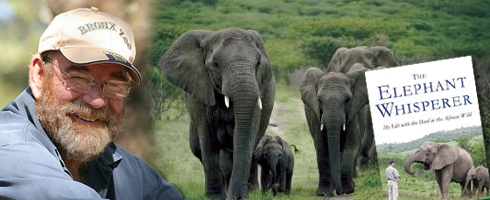
Meet the ‘Indiana Jones of conservation’ who wrote The Elephant Whisperer
As the lives of Bomman and Bellie, the couple who raise two elephant ‘children,’ get global attention after the Oscars, we revisit the book The Elephant Whisperers by Lawrence Anthony

For nature conservationists, winning the Whitley Award (UK) is a dream come true since it is considered to be the ‘Green Oscars’, the highest award a conservationist can get in his or her lifetime. It is the same with filmmakers, more particularly documentary filmmakers, who explore the natural world on celluloid. By winning the 95th Academy Award for The Elephant Whisperers, a documentary on two orphaned pachyderms being raised and cared by a tribal couple in Tamil Nadu’s Mudumalai forest, filmmaker Kartiki Gonsalves has hit two goals with one stride.
The Oscars for the documentary has shed light on how wild animals still believe humans despite all the harms the latter have wreaked on the wildlife. As the lives of Bomman and Bellie — the couple who showers love on two elephant ‘children,’ Raghu and Ammu, and raise them with care — get global attention, it is worth revisiting the book The Elephant Whisperer: Learning About Life, Loyalty and Freedom From a Remarkable Herd of Elephants by Lawrence Anthony, the popular South African conservationist, which possibly became the inspiration for the documentary’s title; incidentally, March 2 marked Anthony’s 11th death anniversary.
A conservationist non-pareil
Born in Johannesburg, South Africa, Lawrence Anthony has been described as ‘Indiana Jones of Conservation’ by Graham Spence, his co-writer. He tried conserving literally every other animal, big or small, that came across his way.
Also read: Elephants are like our children, says Belli of Oscar-winner ‘The Elephant Whisperers’
“I grew up in the bush and it just stayed with me,” he said in an interview to The Guardian in 2009. In the mid-90s when Thula Thula Private Game Reserve, the oldest game reserve in KwaZulu-Natal province, was put up for sale, Lawrence left his real estate and insurance business, bought the reserve and switched to a career as a conservationist. The reserve, in ancient times, was owned by Zulu King Shaka.
Lawrence, who extended his support as a conservationist to Baghdad Zoo in 2003 amidst the US-Iraq war for six months, had a dream to establish a new game reserve known as Royal Zulu Game Reserve by integrating the adjoining lands which are related to Zulu tribes. He closely worked with the tribes in establishing the reserve that he believed would support the locals through wildlife tourism.
The Elephant Man
His biggest turning point as a conservationist came in 1999, when he was requested to accept a herd of nine rogue elephants by another reserve from Mpumalanga. After witnessing their own species getting killed by humans, they became rogue and became life-threatening to the reserve and the locals.
While Lawrence accepted the herd for free of cost, they were handed over with a caveat. If the elephants returned to their native reserve, they would be shot and killed. Despite having deterrent measures such as electric fences, the herd kept crossing the fences and tried to return to their original reserve.
Lawrence believed that by developing human contact with at least one elephant in the herd, the fence-breaking sessions would be over. To achieve that, he needed to earn the trust of the matriarch of the herd, Nana. That could be done only through communicating with her regularly, amidst all risks.
How he developed a personal relationship with the herd through communications forms the subject of his second book, The Elephant Whisperer (2009), co-authored by Graham Spence, a journalist.
For all his efforts in successfully reintroducing the elephants in his 5,000 acres of pristine bush, he descibed his rendezvous with the elephants humbly: “Make no mistake, the title of this book is not about me for I make no claim to any special abilities. It is about the elephants – it was they who whispered to me and taught me how to listen,” he wrote in the prologue of the book.
Of wild, conservation & continent
Lawrence penned every detail to the minute, from the day one of hearing the distress call from Mpumalanga to accept the herds to constructing shelters for elephants to erecting electric fences surrounding the vast reserve to making efforts to acclimatize the elephants in their new homes to developing a relationship with the herd.
Also read: Elephant Whisperers: This documentary, up for Oscars, is a triumph of empathy
Throughout the book, he shares some of the valuable information that keeps the reader engaging. For instance, about the elephants: “a herd of wild elephants on the run in a populated area would be the conservation equivalent of the Chernobyl disaster”. On how to conduct oneself in forests: “it’s bad bush practice to keep a light on continuously as light attracts insects, insects attract frogs, and frogs attract snakes”.
Lawrence’s of activities extended to the socio-political-cultural side of Africa. On Africa’s battle with AIDS, he records: “on the streets the slang for Aids was ‘slow puncture’, a particularly apt description of how the disease gradually saps one’s life”; and on the belief of tribes: “they believe that after death there is no heavenly reward or hellish retribution, only a reassumption of the personality of an ancestor, from where one continues a never-ending role in the eternal symbiosis between the spiritual and material worlds. These deep-seated beliefs are poorly understood and too easily ridiculed by many Westerners who think they know best”.
For all his contribution as a conservationist, from protecting snakes to rhinos to elephants to vultures, the wisdom he earned was simple yet strong. “But perhaps the most important lesson I learned is that there are no walls between humans and the elephants except those we put up ourselves, and that until we allow not only elephants, but all living creatures their place in the sun, we can never be whole ourselves,” Lawrence once said.

